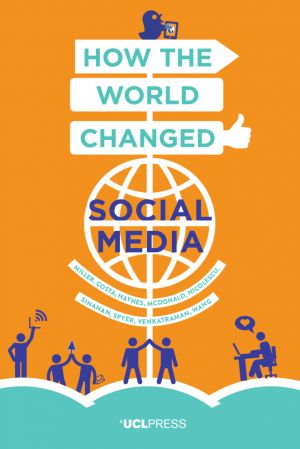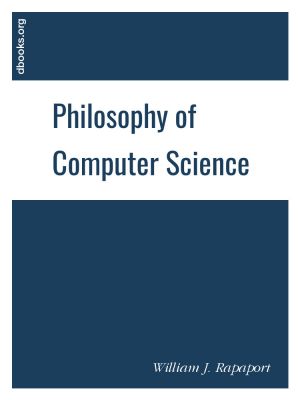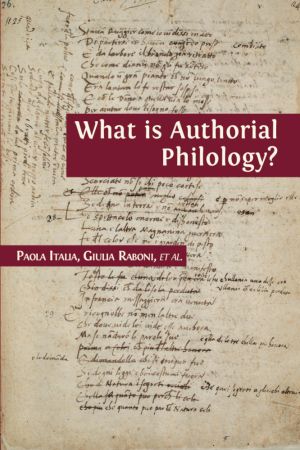What is Authorial Philology?
by Paola Italia, Giulia Raboni
DescriptionTable of ContentsDetailsHashtagsReport an issue
This pioneering volume offers both a methodical set of instructions on how to read critical editions, and a wide range of practical examples, expanding upon the conceptual and methodological apparatus laid out in the first two chapters. By presenting a thorough account of the historical and theoretical framework through which authorial philology developed, Paola Italia and Giulia Raboni successfully reconceptualize the authorial text as an ever-changing organism, subject to alteration and modification.
What is Authorial Philology? will be of great didactic value to students and researchers alike, providing readers with a fuller understanding of the rationale behind different editing practices, and addressing both traditional and newer methods such as the use of the digital medium and its implications. Spanning the whole Italian tradition from Petrarch to Carlo Emilio Gadda, this ground-breaking volume provokes us to consider important questions concerning a text's dynamism, the extent to which an author is 'agentive', and, most crucially, about the very nature of what we read. 






Book Description
A stark departure from traditional philology, What is Authorial Philology? is the first comprehensive treatment of authorial philology as a discipline in its own right. It provides readers with an excellent introduction to the theory and practice of editing 'authorial texts' alongside an exploration of authorial philology in its cultural and conceptual architecture. The originality and distinction of this work lies in its clear systematization of a discipline whose autonomous status has only recently been recognised (at least in Italy), though its roots may extend back as far as Giorgio Pasquali.This pioneering volume offers both a methodical set of instructions on how to read critical editions, and a wide range of practical examples, expanding upon the conceptual and methodological apparatus laid out in the first two chapters. By presenting a thorough account of the historical and theoretical framework through which authorial philology developed, Paola Italia and Giulia Raboni successfully reconceptualize the authorial text as an ever-changing organism, subject to alteration and modification.
What is Authorial Philology? will be of great didactic value to students and researchers alike, providing readers with a fuller understanding of the rationale behind different editing practices, and addressing both traditional and newer methods such as the use of the digital medium and its implications. Spanning the whole Italian tradition from Petrarch to Carlo Emilio Gadda, this ground-breaking volume provokes us to consider important questions concerning a text's dynamism, the extent to which an author is 'agentive', and, most crucially, about the very nature of what we read.
This open book is licensed under a Creative Commons License (CC BY). You can download What is Authorial Philology? ebook for free in PDF format (16.8 MB).
Table of Contents
Chapter 1
History
Chapter 2
Methods
Chapter 3
Italian Examples
Chapter 4
European Examples
Chapter 4.1
Lope de Vega's La Dama Boba
Chapter 4.2
Percy Bysshe Shelley's Poems
Chapter 4.3
Jane Austen's The Watsons
Chapter 4.4
Marcel Proust's À la recherche du temps perdu
Chapter 4.5
Samuel Beckett's En attendant Godot / Waiting for Godot
Book Details
Title
What is Authorial Philology?
Subject
Literature
Publisher
Open Book Publishers
Published
2021
Pages
216
Edition
1
Language
English
ISBN13
9781800640238
ISBN10
1800640234
ISBN13 Digital
9781800640252
ISBN10 Digital
1800640250
PDF Size
16.8 MB
License

Related Books

We've all heard it: according to Hal Varian, statistics is the next sexy job. Five years ago, in What is Web 2.0, Tim O'Reilly said that "data is the next Intel Inside." But what does that statement mean? Why do we suddenly care about statistics and about data? This report examines the many sides of data science - the technologi...

This is a chapter from Absence in Science, Security and Policy edited by Brian Rappert and Brian Balmer. Part reflection on the forthcoming chapters, part analysis of academic literature, and part programmatic agenda setting, this introduction chapter forwards the importance of questioning taken for granted assumptions in sensing what is absent as ...

How the World Changed Social Media is the first book in Why We Post, a book series that investigates the findings of anthropologists who each spent 15 months living in communities across the world. This book offers a comparative analysis summarising the results of the research and explores the impact of social media on politics and gender, educatio...

This book is an inspirational message about what is possible and practical in the name of learning through mobile media. We present stories from a diverse set of educators, a microcosm of the landscape of mobile media learning.
Each author has found a way to create something new and beautiful in their own world. And though their results are exce...

This book looks at some of the central issues in the philosophy of computer science. It is not designed to answer all (or even any) of the philosophical questions that can be raised about the nature of computing, computers, and computer science. Rather, it is designed to "bring you up to speed" on a conversation about these issues - to gi...

Climate change negotiations have failed the world. Despite more than thirty years of high-level, global talks on climate change, we are still seeing carbon emissions rise dramatically. This edited volume, comprising leading and emerging scholars and climate activists from around the world, takes a critical look at what has gone wrong and what is to...

